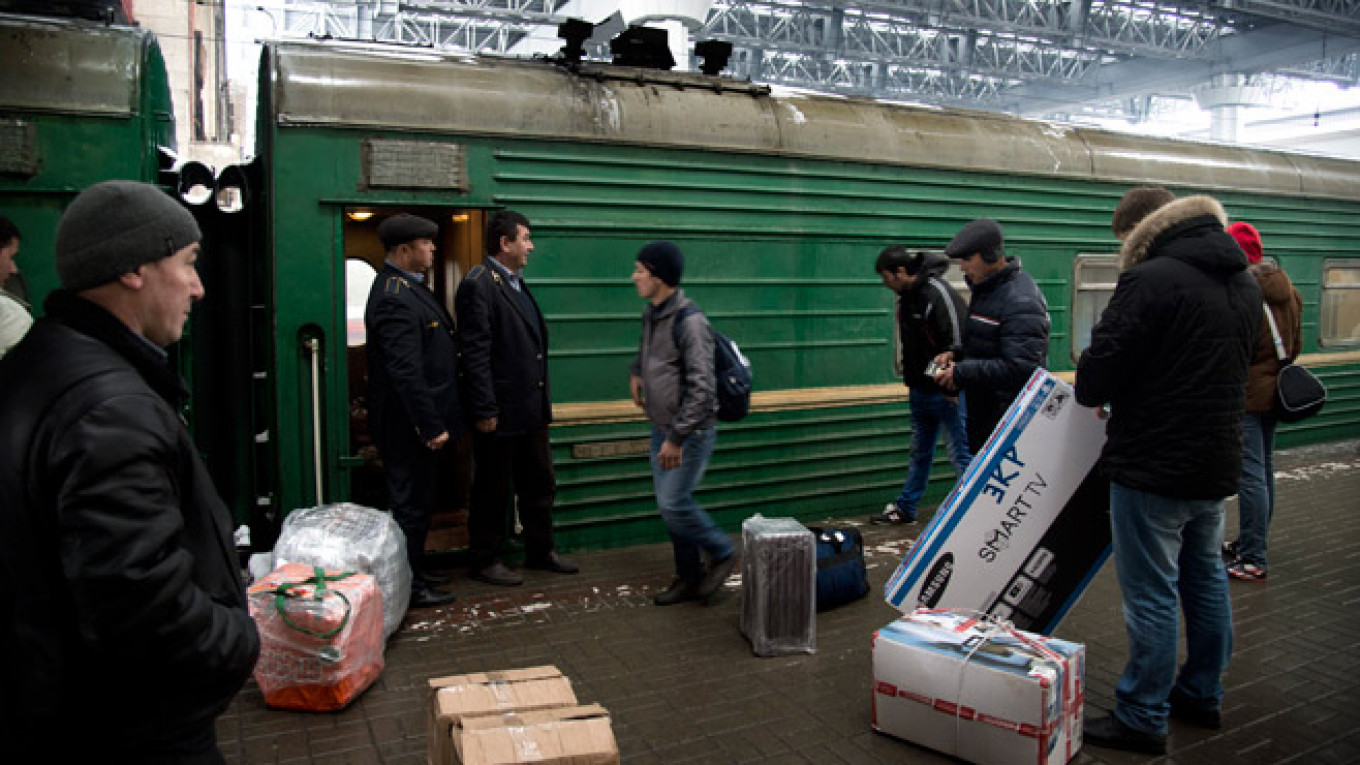Foreigners seeking work permits or residency in Russia may soon have to answer questions about Crimea's “joining” of the country and the rule of Soviet dictator Josef Stalin, according to a draft immigration test published by Russian media on Monday.
The new test, which still must be approved by the Education and Science Ministry, is expected to be introduced by July 1. The test will replace a less complicated exam that all foreigners seeking work in Russia have been obligated to take since the start of this year,? Izvestia reported Monday, citing Anzhela Dolzhinkova, the provost for foreign student affairs at Peoples' Friendship University in Moscow.
Like the current test, the new version would include questions on Russian language, law and history, but the minimum vocabulary requirement for those seeking residency would increase to 1,250 words from the 950 currently required. The vocabulary requirement for those seeking a work permit would remain at 950 words, the report said.
The biggest changes appear planned for the history section.
Twenty multiple choice questions would test foreigners on their knowledge of various aspects of the nation's past, including Crimea's history as part of Russia and Stalin's rule, according to a copy of the draft exam published by Izvestia.
Questions included the following:
— “In which century did Crimea join Russia under Catherine the Great?”
The correct answer is the 18th century, which the test spells in Roman numerals: XVIII. Catherine annexed Crimea in 1783, nine years after the peninsula gained a degree of independence from the Ottoman Empire amid Russo-Turkish wars.
— “The decisive battle of the Great Patriotic War [World War II] was ...”
The correct answer is the Battle of Stalingrad — the city now known as Volgograd. The other two answer choices in the test — the battles of Poltava and Kulikovo — took place centuries before World War II.
— “The Soviet Union's policy in the 1930s to consolidate peasant households into kolkhoz [collective farms] was called …”
The program, enforced by Stalin from 1928 to 1940, was “collectivisation.” The forceful consolidation was marked by violent persecution of successful farmers and other peasants who opposed the prospect of giving up their lands to join a kolkhoz.
The exam's sole question about a living public figure refers to Irina Rodnina – whom test-takers are required to identify as a “well-known” Russian athlete, writer or actress. Rodnina, a three-time Olympic figure-skating champion, is also currently a member of the State Duma from the ruling United Russia party with a staunchly pro-Kremlin voting record.
The draft immigration exam also features five open-ended questions, required only for those seeking a residence permit. These questions ask test-takers to name the leader who headed the Soviet Union during World War II, and name the republic that joined Russia in 2014. That leader was Stalin, and the republic was Crimea, which Moscow annexed from Ukraine last spring.
Other open-ended questions, which may prove difficult even for many Russians, include naming the document that Russia adopted on June 12, 1990, the year of the country's first revolution and a monument that symbolizes the city of St. Petersburg.
The answers? The document was the declaration of state sovereignty, passed by the legislature of the then-Soviet republic of Russia, proclaiming a “democratic, lawful” state within a “renovated” Soviet Union; the revolution known as Russia's first took place in 1905 and established a constitutional monarchy.
As to what best symbolizes St. Petersburg, the municipal administration's official website identifies three monuments as the city's historical symbols — the figure of a sailing warship on top of the Admiralty building, the angel statue on the spire of the Peter and Paul Fortress, and the Bronze Horseman monument to Peter the Great. Presumably all would be acceptable answers.
Currently, all long-term visa applicants take the same test, but applicants for work permits must answer 60 percent of questions correctly, while applicants for resident status need to nail 75 percent, Dolzhikova said, Izvestia reported.
About 440,000 foreigners have taken the test since it was made mandatory this year, Izvestia reported.
The fee to take the exam runs 4,900 rubles ($86) for work permit applicants and 5,300 rubles ($94) for residency applicants, but fees may vary depending on the nationality of the person taking the exam, Izvestia reported.
There is a discount rate of 2,500 rubles ($44) for people whom Izvestia described as the “citizens of the Donetsk and Luhansk republics” — the self-proclaimed states run by Moscow-backed insurgents in eastern Ukraine.
Contact the author at newsreporter@imedia.ru
A Message from The Moscow Times:
Dear readers,
We are facing unprecedented challenges. Russia's Prosecutor General's Office has designated The Moscow Times as an "undesirable" organization, criminalizing our work and putting our staff at risk of prosecution. This follows our earlier unjust labeling as a "foreign agent."
These actions are direct attempts to silence independent journalism in Russia. The authorities claim our work "discredits the decisions of the Russian leadership." We see things differently: we strive to provide accurate, unbiased reporting on Russia.
We, the journalists of The Moscow Times, refuse to be silenced. But to continue our work, we need your help.
Your support, no matter how small, makes a world of difference. If you can, please support us monthly starting from just $2. It's quick to set up, and every contribution makes a significant impact.
By supporting The Moscow Times, you're defending open, independent journalism in the face of repression. Thank you for standing with us.
Remind me later.


